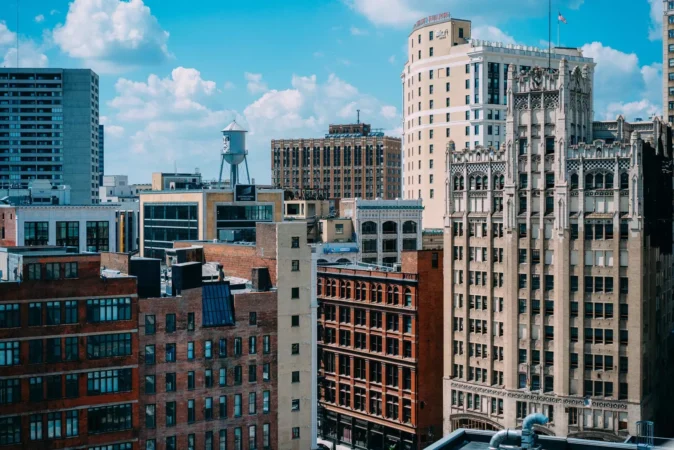The second annual Urban Transformation Summit in Detroit will take place Oct 10-12. Visionary leaders from business, government, civil society, media, and philanthropy from around the world will convene in Detroit. It is led by internationally recognized government leader, innovator, and entrepreneur, Jeff Merritt, and staffed by a global team at the World Economic Forum’s offices in Beijing, Geneva, Mumbai, New York, San Francisco, and Tokyo.
Merritt shares insights on the Summit goals, the timing, the impact on Detroit, and its importance for generations to come.
Q: What is the impetus behind the Urban Transformation Summit?
A: First, I think the COVID pandemic and incidents in recent years have illustrated that we are at a point of incredible instability and turmoil — and cities are on the front lines. When it comes to COVID, the energy crisis, the geopolitical situation, climate change inequality, and the list goes on, the urban population is most impacted by these global challenges, but is also the greatest contributor.
Meanwhile, we are not seeing an increase in local government budgets and staff to handle the growing demands.
So, the question becomes where do we go from here?
How you tackle big problems is by bringing private and public sectors together to collaborate. The Summit happening in October brings together some of the greatest minds and resources in the world from both sectors to tackle global challenges at a local level.
Q: Why Detroit?
A: When you launch a global initiative like this, it needs a home – a place that ultimately embodies the vision, a place that has a story that resonates with the world.
Detroit is that place. Detroit has been in the global spotlight for many decades. It was once among the wealthiest cities in the world – a hub of innovation and entrepreneurship that was shaping the global economy. Then that changed. In the decades that followed has faced enormous challenges.
But the city didn’t accept that fate. It figured out how to adapt and renew.
The world needs a comeback story and Detroit is an incredible comeback story, one that is not complete but inspirational, nonetheless. It’s also an example of the new norm. Detroit is coming back because stakeholders from all sectors are coming together to find solutions.
Q: In your opinion, are the innovations happening in Detroit relevant globally?
A: Absolutely. New and innovative things are happening here. Detroit was recently named the #1 start-up ecosystem in the world.
Take mobility as an example. In development right now are three big mobility projects. One is Michigan Central Station, a $1b investment in mobility innovations, which recently announced an electrified road that can charge EV’s as they drive.
Another is Cavnue, an innovation company that’s building the first road for connected vehicles in the country, which will loop from Ann Arbor to downtown Detroit. There are many smaller but equally impactful innovations happening that will have an impact globally.
Our Next Energy, (ONE) an EV battery start up just announced a $1.6 gigafactory to create 2,112 jobs in Wayne County, which is incredibly significant when it comes to innovation happening in Detroit.

OUR NEXT ENERGY BATTERY PLATFORM
Q: From a public and private sector collaboration standpoint, do you think Detroit is viewed as a best-in-class example?
A: I don’t think there is a best-in-class when it comes to this. Because that suggests in some ways that there is a formula or a right and wrong way to go about collaborating.
The exciting thing about Detroit is the willingness of stakeholders to come together. And it’s not just business and government coming together. It’s philanthropy, academia, and civil society as well. It’s all parties coming to the table to see how they can contribute.
We also have to keep in mind that not all collaborations will be successful. Sometimes there are unintended consequences. And the world can learn from this. The lessons learned are just as important as setting best practices. But the devil is in the details. We have to go beyond who is contributing the funding and ensure that there is a balance of interest between all parties. We have to ensure that these developments grow the economy and create economic opportunity.
Q: How will the Urban Transformation Summit help facilitate this global connection for both Detroit and for leaders around the world?
A: The Forum has a huge communication platform with the ability to take stories to a global stage. The Summit brings global leaders to Detroit, enabling them to see first-hand the work being done here.
We are offering attendees a Behind the Scenes look at Michigan Central to understand the strategy and decisions and also ask the tough questions to inform their work.
We are also giving a Behind the Scenes tour of Bedrock’s Book Tower, an example of reinventing a historic building for a new era. In the era of climate change, we must repurpose the assets we have, and this is a great example of that.
Bringing people together physically is important. This helps tell the story globally and facilitates connections. The Urban Transformation Summit brings together visionary
leaders from business, government, civil society, media, and philanthropy to forge new partnerships, showcase these innovative solutions and mobilize action.
Q: How do the new stimulus and infrastructure funding coming into cities play a role in what will be addressed at the Summit?
A: This is a huge focus for the Summit. The Summit is happening at a point of significant change in cities. In the last 24 months, two enormous pieces of legislation have become law – the bipartisan infrastructure bill and the Inflation Reduction Act.
This is a once-in-a-generation opportunity and we need to make sure we are delivering on that potential and maximizing it.
And this is by no means a given.
Historically, when stimulus funds are given, we are in rush to spend and end up investing more in ‘shovel ready’ projects as opposed to ‘shovel worthy projects.’ We fill potholes and create more highways when we should be rethinking the entire way we build infrastructure to align with current and future challenges.
As we create a new EV economy, we need to think collectively about how we create the infrastructure to not only provide for the operation of EV’s but also to facilitate new economic opportunities around every piece of that infrastructure.
We are in a critical moment and the decisions we make now and in the next few months will impact us for hundreds of years to come.
Collaboration on this and many other issues that cities are facing could not be more critical right now.
Sponsored Content: World Economic Forum






















